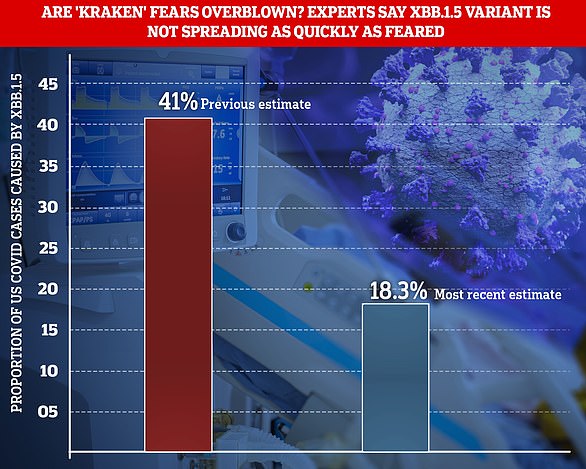Why there’s NO reason to worry about Covid death uptick in NY
>
Scientists have sought to calm fears over rising Covid deaths in New York, saying a rise during the winter months was to be expected.
Covid data from the state’s health department shows 915 people died from Covid in December, up 30 percent from the 664 last month.
Concerns were raised by some experts and media outlets, who stressed that deaths had ‘spiked’ and ‘people had let their guard down’.
But deaths are running at half the level compared to December 2021, and a third of the level of winter 2020. The current rate is also a far cry from the 16,000 monthly fatalities New York suffered early in the pandemic.
Dr Denis Nash, an epidemiologist at City University of New York, told DailyMail.com that the drop in Covid fatalities showed that vaccines, boosters and antivirals were working, adding that it underlined ‘how far we’ve come’.
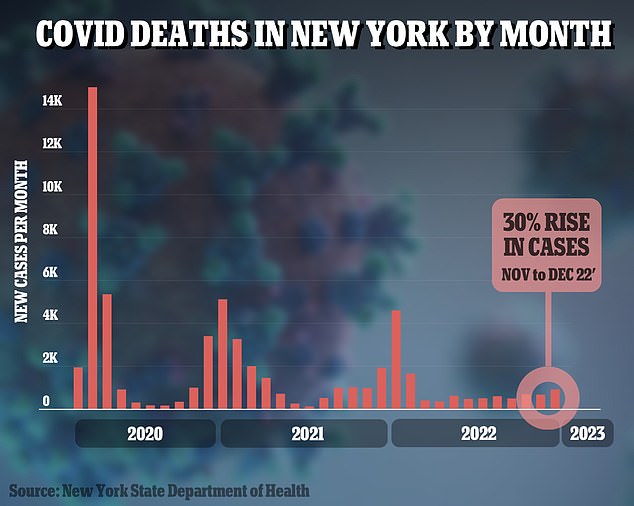
The above graph shows Covid deaths in New York state by month, and the rise by 30 percent which was described as a spike by the New York Post
But fatalities from respiratory illnesses — including Covid, flu and RSV — are expected to rise at this time of year because colder conditions lead to people spending more time indoors, where the virus finds it easier to spread.
The country is also currently being battered by a tripledemic, after flu and RSV cases surged earlier than expected overwhelming children’s hospitals.
Fears have been raised over the ‘Kraken’ variant XBB.1.5 — for which New York is a hotspot — but there is no sign that it is more likely to cause severe disease than its rivals. Experts came forward today to suggest concerns were overblown and that it was not spreading as fast as previously suggested.
Presented with the figures on New York state, Dr Nash told DailyMail.com: ‘I think this figure is a sign of how far we’ve come.
‘I mean, the first thing that comes to mind is all the increasing immunity that people have developed from vaccines and boosters and infections.
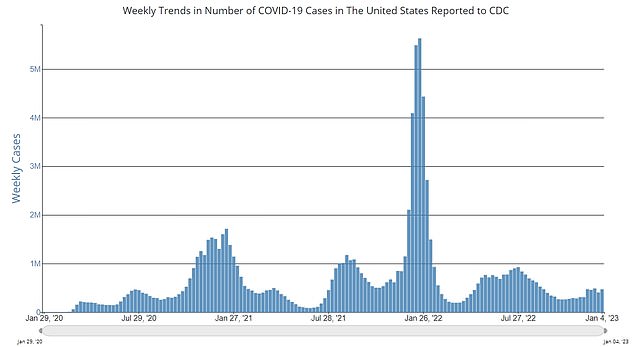

The above graph shows Covid cases by week across the United States. Cases in the US have now hit more than 100million recorded to date
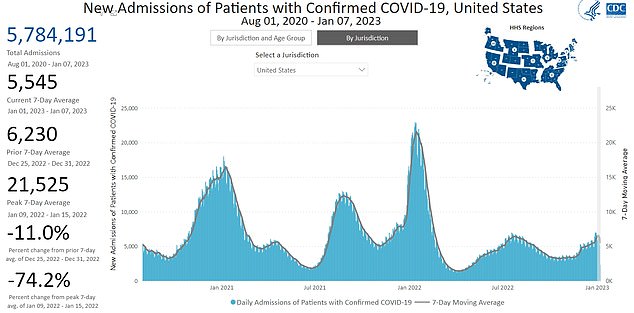

This graph shows hospital admissions by week across the United States
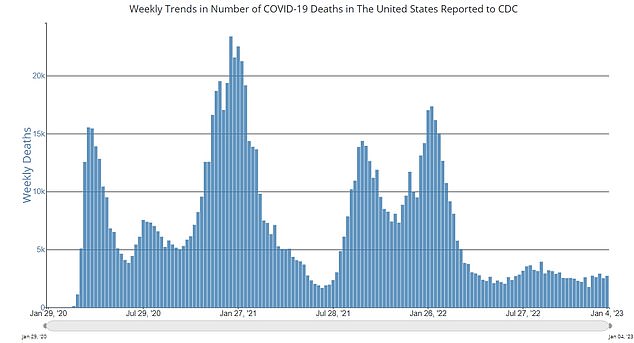

This graph shows deaths by week across the United States
‘The next thing that comes to mind is people, not enough, but many people are accessing antivirals when they become infected with Covid that can reduce their risk of a severe outcome.
‘As we move further along in the pandemic, we are getting better and better at preventing the worst.’
He added that it was not surprising to see Covid fatalities rise in winter, when respiratory viruses are more likely to spread.
‘We expect a winter surge to happen,’ he said.
‘We saw a blip after the thanksgiving holidays, and I think people gathered more after the Christmas holidays and New Year’s so we are expecting to see an increase in cases and deaths after that as well.’
Dr Nash also warned that there were still too many people dying from Covid across the US, with around 390 daily fatalities.
About 29 people are dying from Covid in New York every day, up from 22 last month.
Hospitalizations are currently flat with about 734 people admitted every week on average.
And about 2,400 people are catching the virus every day, also a small change from last week, although this may be down to a lack of testing.
Nationally, hospitalizations are down by 11 percent on the previous week to 5,545 new patients in hospital every week on average, down from 6,230 previously.
But deaths are trending upwards, with 2,731 recorded last week up eight percent on the previous seven-day spell.
Covid cases are level nationally with about 470,000 recorded in the week to January 4 alone.
America has recorded the most fatalities from Covid out of any nation in the world, with the current tally at more than 1.091million.
And last week it became the first country in the world to officially top 100million infections.
Estimates suggest at least 60 percent of Americans had already been infected with Covid from April, giving them substantial immunity.
Some 73 percent — or 228million people — have also come forward to get their first two doses of the Covid vaccine.
The US, in line with other countries, has also run a booster programme this year to shore up immunity in the country.
Studies show that protection can wane overtime in older people, who are more at risk of severe disease and death if they catch the virus.
But just 38 percent of those over 65 years old have come forward for a bivalent booster this year.
In other news…
US becomes first country to hit 100million Covid cases, amid reports China suffered 250million alone last month.
Are ‘Kraken’ fears overblown? Experts say XBB.1.5 variant is NOT spreading as quickly as feared.
Moderna will jack up price of its Covid shot FIVE-FOLD to $130 this year to match rival Pfizer’s

